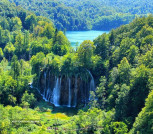
Tour guides, a passion and a profession
Tour guides work in the tourism industry, guiding groups of visitors and individuals. Tour guides are experts not only in the area of history of a place, region but also know local customs and curiosities. Tour guides offer their clients interesting, interesting and informative information about the city, historical events, natural attractions, historical places, museums, sightseeing places and other travel destinations. Tour guides can lead walking tours, bus tours, and even lead riverboat tours. Often hired by travel agencies or tour companies, tour guides are usually residents of the region in which they are guiding tours.
Ready to take the next step?
Tour guides told us they needed a web portal to promote their services. That's how odyseos.com was created. A portal where tourists can directly communicate with local tour guides. People who live in the city where they are offering their services.
Tour guides and their services
Tour guides guide groups of visitors or individuals.
The duties of tour guides depend on where they live and their employer. If they are self-employed, they usually guide tours of tourist sites, cities, museums, sports facilities, national parks or natural attractions. Tour guides who are employed by a travel agency or corporation offer tours of cities, industrial sites or other points of interest. The three main areas of specialization in the tour guide industry are:
- Historic tour guides.
- Tour guides for corporate tours
- Tour guides for nature or eco-tourism tours.
History tour guides lead groups of visitors to national monuments, historical sites, historic districts, religious or archaeological sites, and museums. Tour guides are well versed and have extensive knowledge of the history of places, monuments, and events that took place. Local Tour guides offer visitors an interesting description of the place, including its history and the impact it has had on modern society. In addition, they answer visitors' questions and manage the organized tour safely and according to the tour plan.
Local tour guides can be hired by large, international companies, which are usually well-known corporations although non-profit organizations often need guides as well. Local tour guides take groups through factories, describing the production process, history and mission of the company. Amusement parks often employ local tour guides to take visitors through a museum located within the park that documents the history of the company's accomplishments. Local tour guides may also work in zoos, wildlife refuges, safari parks, or animal reserves, informing visitors about animal behavior and the company's goals.
Local wildlife tour guides lead groups through natural attractions, national parks, and other outdoor locations where wildlife and scenic spots are the primary focus of the tour. Local tour guides are experts in the natural sciences and have the ability to engage visitors with their knowledge of the biology, geology and history of a place. An increasingly popular area of the industry is environmental tours. The goal of local eco-tour guides is to lead a group of people to an often protected but scenic natural area with little or no environmental impact. Visitors are offered knowledge about the impact of human activities on the environment, and local Tour guides seek to foster a general appreciation for the natural environment.
Regardless of a tour guide's specialty, some basic responsibilities apply to all positions. Their primary responsibility is to make sure that the tour is as safe as possible for the entire group. They will monitor the group's activities to make sure that everyone is following the safety regulations of the site or guide. In some cases, they may need to provide first aid or emergency assistance to visitors. Local tour guides usually plan itineraries, as well as organize every step of the visitor service process from greeting visitors upon arrival to arranging transportation between sites. Sometimes local Tour guides are also required to perform clerical duties, collect fees, and in many cases, promote gift stores and sell souvenirs.
Local tour guides
Tour guides know how to work independently. They tend to be social people, which means they are polite, generous, cooperative, patient, caring, helpful, empathetic, tactful, and friendly. They excel at socializing, helping others, sharing knowledge and teaching. Some are also entrepreneurial, which means they are adventurous, ambitious, assertive, extroverted, energetic, enthusiastic, confident and optimistic.
Who are local tour guides?
Local Tour guides work in the tourism industry, guiding groups of visitors. They are experts in the history of a place and offer their groups interesting or informative information about points of interest at natural attractions, historical sites, museums, scenic spots and other travel destinations. Local tour guides can lead walking tours, bus tours, and even lead riverboat tours. Often hired by travel agencies or tour companies, local tour guides are usually residents of the region in which they are guiding tours.
Local Tour guides, what is the demand for their services?
When most people hear the term 'tour guides', they usually think of guides who show travelers around places of interest, either in one city or country or in multiple locations as part of a longer tour. The fact is, however, that local tour guides are employed in this field, and the demand for and employability of those employed in each sector varies depending on a number of factors.
Certainly, the job prospects for local Tour guides who guide tourists to museums, galleries and religious sites depend on the number of tourists. Local Tour guides must be able to know facts, figures and events and be able to convey them in a convincing manner. These tour guides, who accompany groups on itineraries that span multiple cities or countries, are responsible for almost every detail of the tour and must have organizational skills and the ability to understand different cultures.
In many European countries, local tour guides must pass rigorous exams and obtain a license to practice. In the United States, there are few regulations for tour guides and they are usually not required to obtain a license. Regardless of where local tour guides work, knowledge of local history and attractions, communication skills, comfort with public speaking, and knowledge of more than one language are definite assets for advancement in this profession.
Experience in theater or entertainment or experience in teaching will also increase a candidate's chances of being hired. Tour guides who work with corporations suffer from misnomers. They are not tour guides. They are "tour directors" or "travel directors" or "tour directors," and their duties are very different from those of traditional tour guides.
Tour guides, a passion and a profession
Tour guides sometimes act as traveling concierges who cater to the needs of corporate incentive tour participants. Aspiring tour guides must be prepared for very long days, multiple changes to pre-planned programs, and often unexpected requests and demands from guests who, in most cases, have won their tours in exchange for achieving sales or management goals. Because tour guides sometimes travel to and from destinations with their groups, they are more likely to succeed if they have additional skills in airline reservations and ticketing procedures, as well as foreign language skills. High energy levels, the ability to think creatively, and a willingness to problem-solve are essential to success in this role.
The first step to choosing a profession is to make sure that you are actually willing to commit to working very different hours. You do not want to waste your time doing something you are not passionate about.
Still not sure if becoming a tour guide suits you? Ask other people. You can find many people who are tour guides on the tour guide portal odyseos.com. Maybe also in your city or area. Get in touch with them. Talk about what their job is like.
How do you become a tour guide?
In most cases, you don't need a high school diploma or equivalent certificate. Sometimes a college degree is required, which varies from company to company, but often a bachelor's degree in a tourism-related field is necessary. Museum guides, for example, usually have a background in history, and environmental tour guides often specialize in conservation or environmental education. In most cases, local tour guides provide on-the-job education that includes safety training.
Most importantly, local tour guides must be experts in their field. They must be able to answer specific questions about places, their history, and their amenities. Effective communication skills are absolutely essential to a successful career in the tourism industry. In addition, tour guides must be highly organized, punctual and ethical. They must have exceptional time management skills and be able to thoroughly research relevant information. The ability to speak multiple languages, while not essential, is an asset for many tour guides.
Tour guides are sociable and entrepreneurial
Local Tour guides tend to be social people, which means that they feel comfortable in situations where they can interact with, persuade, or help people. They also tend to be entrepreneurial, which means they are usually natural leaders who can influence others and convince them of their reasons, proposals.
If you are one or both of these archetypes, you may be well suited to the role of a tour guide. However, if you are not very creative, and especially don't like working under uncertainty, this is probably not the career for you.
Private guided tours are a whole new way to travel when it comes to using travel services!
It is a modern and very convenient way of exploring cities, getting to know their attractions.
Using a local private tour guide allows you to customize your itinerary, so you can visit the wonderful hidden gems of the world while traveling in comfort. A private tour guide is not just a travel guide. Private tour guides become your new temporary friends who are there to make you feel as if you have been to a particular city many times before and visit once again, old familiar places to fully discover their atmosphere and vibe once again.


 Svenska (Sverige)
Svenska (Sverige)  Nederlands (nl-NL)
Nederlands (nl-NL)  Italiano (Italia)
Italiano (Italia)  Español (España)
Español (España)  Français (France)
Français (France)  Deutsch (Deutschland)
Deutsch (Deutschland)  Polski (PL)
Polski (PL) 




